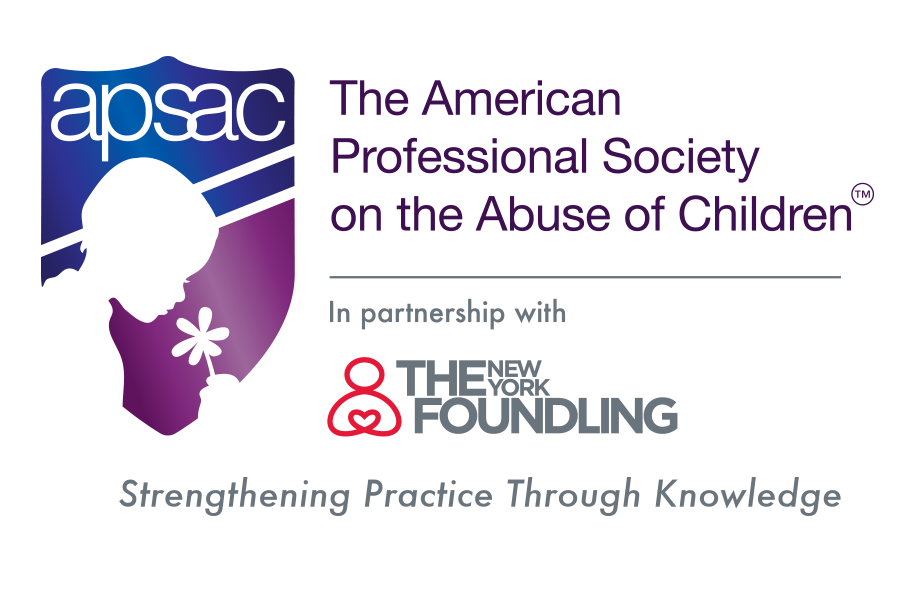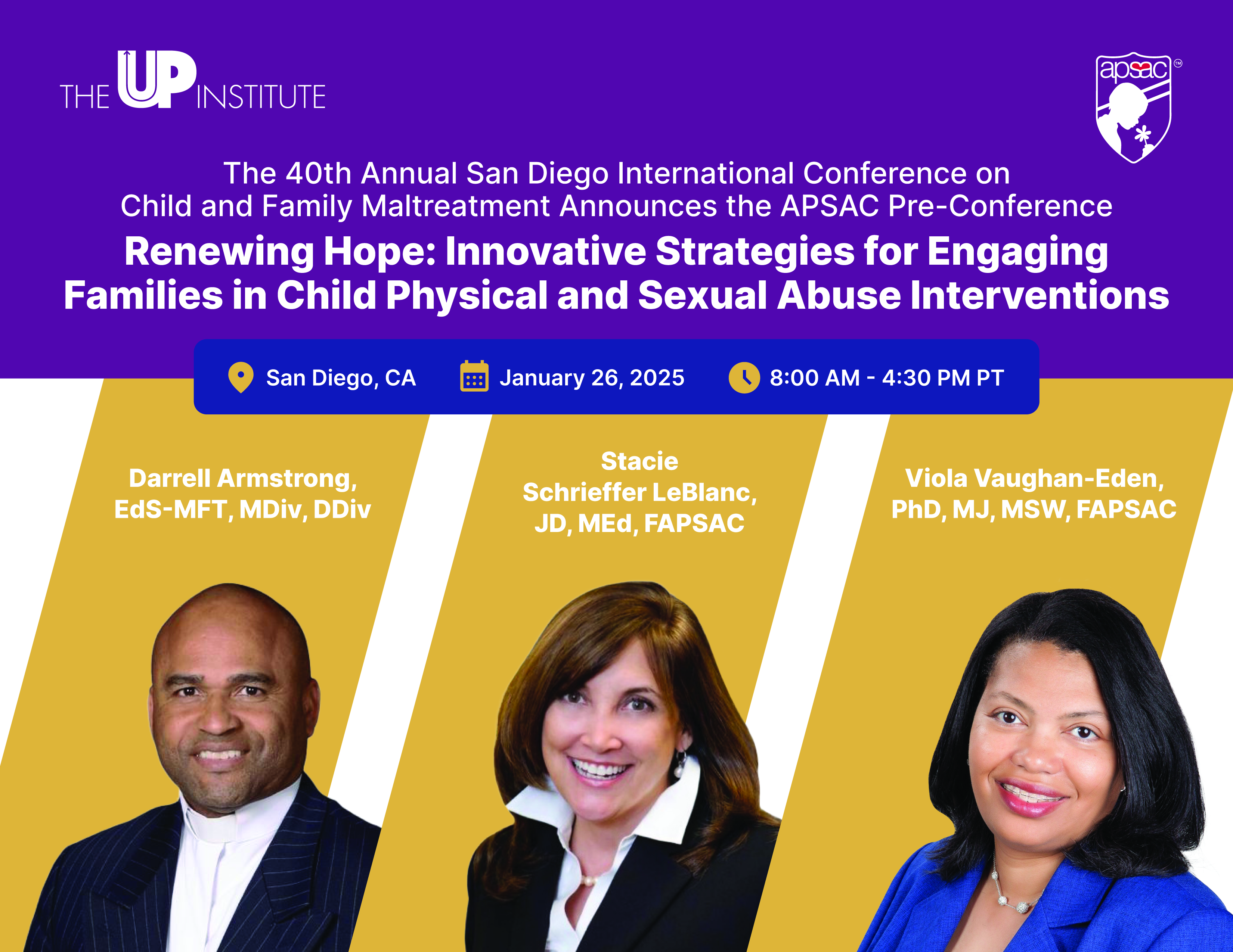
8:00 AM - 4:30 PM Eastern

Renewing Hope: Innovative Strategies for Engaging Families in Child Physical and Sexual Abuse Interventions
Presenters:
Stacie LeBlanc, JD, MEd
Darrell Armstrong, EdS-MFT, MDiv, DDiv
Viola Vaughan-Eden, PhD, MSW, MJ, LCSW
Morning Session:
Strategies for Engaging Nonoffending Caregivers and Addressing Professional Challenges in Child Sexual Abuse Cases
Child sexual abuse remains a pervasive societal issue, with nonoffending caregivers playing a crucial role in ensuring effective case outcomes and supporting child victims’ recovery. This workshop explores the complex dynamics of culpability, belief, and support in child sexual abuse cases, emphasizing the indispensable role of nonoffending caregivers from initial disclosure through forensic interviews, legal investigations, prosecution, and treatment.
Featuring two case histories of adult survivors, the session provides a window into the lasting impact of caregiver support on the long-term healing and outcomes for child victims. Participants will learn strategies to address challenges in engaging nonoffending caregivers, navigate professional frustrations, and apply trauma-informed approaches to foster caregiver involvement and kinship support in investigations.
This workshop underscores the importance of cultural sensitivity in investigations and interventions, identifying it as essential for the welfare of the child and family. Participants will also discuss the intergenerational aspect of child sexual abuse, addressing recidivism within families and the need for culturally sensitive practices to prevent and break abuse cycles.
In discussing implications for research, practice, and policy, the workshop advocates for a holistic, evidence-based approach that considers the complex, intergenerational nature of child sexual abuse cases. Participants will explore ways to advance research, foster supportive policies for nonoffending caregivers, and enhance collaborative, trauma-informed practices among professionals involved in child abuse investigations and treatment.
1. Participants will learn at least 3 practical, trauma-informed strategies to support and engage nonoffending caregivers.
2. Participants will be able to identify at least 3 approaches for managing frustrations in these complex cases.
3. Participants will gain insights into the importance of cultural sensitivity in investigations and be able to identify at least 3 culturally sensitive interventions.
Afternoon:
Get in the Zone: Strengthening Support for Families and Professionals
This interactive session equips professionals with the skills and confidence to implement No Hit Zones—a straightforward, impactful tool proven to strengthen families and address the leading risk factor for child abuse: corporal punishment. Participants will explore how No Hit Zones, successfully established in churches, daycares, hospitals, and child advocacy centers, are transforming child protection efforts and creating safer, more supportive environments. Through case histories featuring outcomes from adult survivors, along with evaluation results and forthcoming research, attendees will gain insight into the tangible impacts of NHZs.
This workshop offers practical strategies to prevent children from entering formal care, reduce professional burnout, enhance kinship care, and support investigative processes. Presenters will delve into community partnerships, innovative approaches for engaging families, and strategies for addressing poverty, while emphasizing collaboration with other family-serving systems, such as education, health, housing, and childcare.
The workshop will highlight the critical role of cultural sensitivity in investigations and interventions, essential for achieving positive outcomes and long-term welfare for children and families. By equipping caregivers with resources and effective alternatives, this session aims to empower child protection professionals to make informed decisions that safeguard children’s future and reduce recidivism.
Advocating a holistic approach to child maltreatment prevention, this workshop underscores the need for ongoing research to support evidence-based practices and policies that assist caregivers and foster a collaborative, trauma-informed framework among child welfare professionals.
1. Participants will be able to identify at least 3 benefits of using No Hit Zones in preventing child abuse.
2. Participants will learn at least 3 trauma-informed communication techniques to effectively engage caregivers.
3. Participants will learn at least 3 culturally sensitive alternatives to support a child’s well-being.
Member Registration: $225
Non-Member Registration: $300
Member & Non-Member 1/2 Day Registration: $160
Pre-Conference Institutes CEs: $35
Full Conference CEs: $75
Continuing education credits are available for Institute attendees at $35/person/day if attending APSAC Institutes only or $75/person if combined with a full San Diego Conference registration. This expense is the responsibility of the conference attendee. To pay for continuing education credits please go to the conference onsite registration desk. Any questions regarding CEs should be directed to sdconference@rchsd.org.
Cancellations:
No cancellations. No refunds. Registration is transferable. Requests for transfer to a future event will also be considered on a case-by-case basis. If you have any questions please email us at onlinetraining@apsac.org.
We look forward to seeing you in person at the Chadwick Center's Annual Conference! Click here for more event details.
Palm Room 5&6
500 Hotel Circle N
San Diego , CA 92108
UNITED STATES
click here for Google Maps